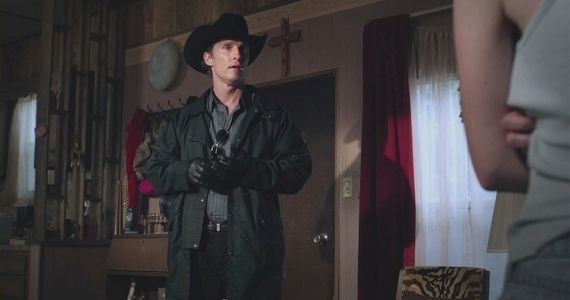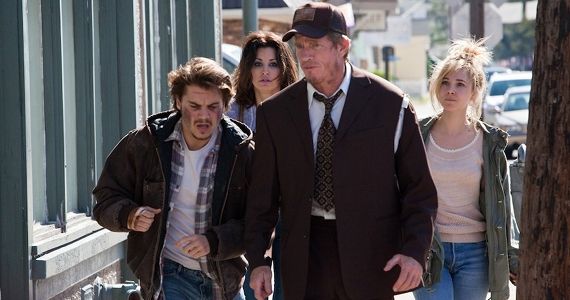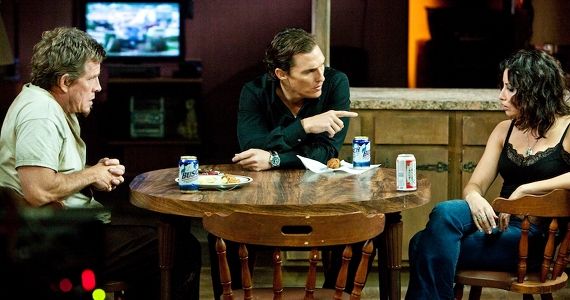Watching the oddity that unfolds onscreen is enough to carry one from start to finish - and despite some truly disturbing scenes, this black-as-night comedy delivers quite a bit of off-beat humor.
In Killer Joe, Chris Smith (Emile Hirsch) is a young, two-bit Texas washout with just enough smarts and small-time ambition to land himself in trouble with all the wrong kinds of people. Facing a debt he can't pay down, Chris comes crashing into the trailer-trash world of his estranged family, which includes simpleton father Ansel (Thomas Haden Church), dragon-lady stepmother Sharla (Gina Gershon) and eccentric younger sister, Dottie (Juno Temple). Chris has a simple plan: hire a hitman to kill Ansel's ex-wife (Chris and Dottie's mother), and thereafter collect the $50,000 life insurance policy that will be bequeathed to Dottie.
The rest of the family jump at the chance to get rid of their devilish ex-matriarch, so Chris turns to "Killer" Joe Cooper (Matthew McConaughey), a lawman who moonlights as a hitman. But as with many such schemes, things don't go quite as planned, and when Joe develops an unhealthy fascination with Dottie, Chris is stuck with a price that he never, ever, wanted to pay.
Directed by Oscar-winner William Friedkin (The Exorcist, The French Connection, The Hunted), Killer Joe is one of the more odd and challenging films I've had to review. Friedkin creates the world of podunk Texas life in such vivid cinematic fashion - and populates it with such uniquely trashy, funny, low-brow characters - that it's hard not to be drawn in. Just watching the oddity that unfolds onscreen is enough to carry one from start to finish - and despite some truly disturbing scenes (more on that later), this black-as-night comedy delivers quite a bit of off-beat humor.
The movie (based on stage play by Tracy Letts, who also wrote screenplay) is very theatrical in its staging and pacing, meaning that scenes each seem somewhat self-contained and weighted, even as they function within a larger narrative. Instead of the typical movie format (rapid turnaround of shots and images through editing), Friedkin's direction takes a stage play approach, presenting things through well-framed and prolonged shots, allowing the actors to move and function and develop the scene on their own, rather than through manipulation of the camera or the editing. The ensemble cast includes some quality players so this directorial approach works well, since the actors are in fact able to carry each scene they are in, without boring the audience.
However, there are distinct times when this "stage play" filmmaking format transforms into something much more visceral and challenging - namely during the multiple sequences of (often sexual) brutality that likely earned Killer Joe its NC-17 rating. Friedkin's lingering lens allows the actors - in particular McConaughey, who is a tour de force in this film- to develop scenes in a way that "normal" moments slowly but surely devolve into insane and horrifying debauchery, while the audience - trapped in their voyeurism - twist and squirm, ultimately witnessing something more disturbing than what they probably imagined. Indeed, much of the Killer Joe experience can be likened to watching a highway collision about to happen - being unable to look away as this horrible event unfolds, laughing as it does, cringing and gagging as the carnage happens - and somehow, being tricked into laughing again while staring at the smoking wreckage.
In the midst of this strange, horrible, hilarious, cathartic experience, Friedkin manages to sneak in some (not so) subtle social commentary, with sacred slices of Americana culture - the cowboy lawman, the "get-rich-quick" American scheme-dream, family values, religion, television, even fried chicken - all getting a twisted and perverted makeover that is unnerving on many levels. The film's controversial finale is enough to turn people away from eating Kentucky Fried Chicken forever (although, true confession, I ended up eating fried chicken immediately after seeing it - though not without much shame and self-disgust).
As stated, Matthew McConaughey dives deep into his role as Joe Cooper and delivers one of the most captivating performances of his career. Joe is a Hannibal Lecture-style psycho - a mannered southern lawman who is also a psychotic monster. While these qualities seemed to be diametrically opposed, McConaughey instead makes them function simultaneously, which makes the character even more disturbingly memorable. Juno Temple is equally captivating as the oddball Dottie, the good soul who is inevitably corrupted by all the amoral people around her. For such a young actress, Temple handles some of the film's more challenging scenes with impressive nuance and control.
Thomas Haden Church is another standout as Ansel, who he manages to turn into a somewhat lovable genial idiot that makes some very, very, questionable moral decisions when it comes to the women in his life. Emile Hirsch and Gina Gershon play more straightforward (read: stock) character types, though they manage to inject the performances with a bit of extra spice. All in all, the family Smith is the epitome of fantastic dysfunction.
Killer Joe will likely leave many people in shock, confusion, and in need of a thorough shower by the time it's done, but those uncomfortable feelings don't prevent the film from also being a memorably odd experience that is likely to stick in your brain - and possibly affect your eating habits - for a longtime afterward.
Killer Joe is currently playing in limited release. It is Rated NC-17 for graphic disturbing content involving violence and sexuality, and a scene of brutality.



